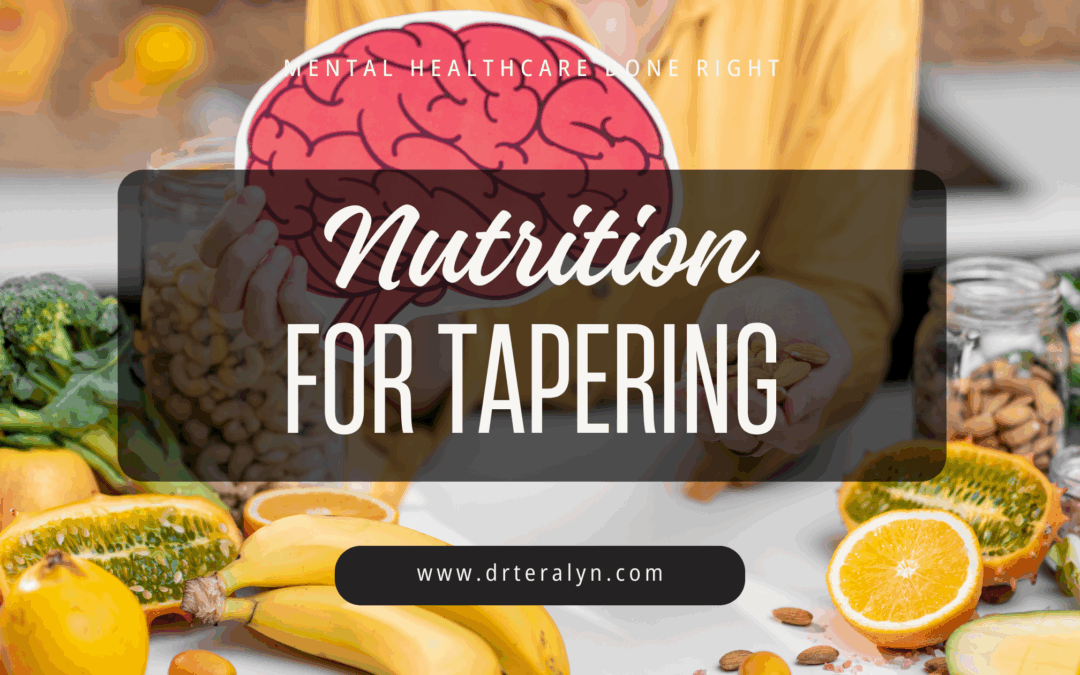If you’re tapering off antidepressants, chances are no one told you this:
Your brain is in recovery. And what you eat could make all the difference.
Antidepressant withdrawal isn’t just about reducing pills—it’s about rebuilding your nervous system from the inside out. And one of the most powerful, accessible tools you have during this process is nutrition.
Let’s talk about how to feed your brain while it’s healing—not just surviving.
🧠 Why Nutrition Matters During Withdrawal
Antidepressants alter levels of neurotransmitters like serotonin, dopamine, and norepinephrine. When you taper off, your brain has to recalibrate—and it’s not always a smooth ride.
Symptoms like:
-
brain fog
-
anxiety
-
mood swings
-
insomnia
-
fatigue
…can feel overwhelming. But here’s the encouraging part: nutritional support can help stabilize your brain’s chemistry, improve resilience, and reduce the intensity of withdrawal symptoms.
🥦 1. Focus on Real Food First
Your brain is hungry for nutrients. It runs on healthy fats, protein, vitamins, and minerals—not ultra-processed foods or sugar spikes.
Prioritize:
-
Colorful vegetables (for antioxidants and fiber)
-
Grass-fed or pasture-raised proteins (for amino acids—precursors to neurotransmitters)
-
Healthy fats (especially omega-3s for brain repair)
-
Slow-burning carbs (sweet potatoes, quinoa, brown rice for stable blood sugar)
Pro tip: If you feel anxious after eating, try smaller, more frequent meals and avoid skipping breakfast—it helps keep cortisol and blood sugar balanced.
💧 2. Hydration & Minerals Are Non-Negotiable
Withdrawal often amplifies fatigue and dizziness. Dehydration and electrolyte imbalance can make it worse.
Support yourself with:
-
8+ cups of filtered water per day
-
A pinch of mineral salt or an electrolyte drink (without added sugar or dyes)
-
Magnesium-rich foods (pumpkin seeds, spinach, avocado) or a magnesium glycinate supplement to support sleep and calm the nervous system
🧬 3. Feed Your Neurotransmitters
You’re not just losing a medication—you’re losing a chemical crutch. Nutrition helps rebuild neurotransmitter pathways naturally.
Try:
-
Eggs, turkey, and lentils (high in tryptophan → serotonin)
-
Beef, fish, and pumpkin seeds (rich in tyrosine → dopamine)
-
Fermented foods (sauerkraut, kefir, miso) to support your gut-brain axis
For some, supplementing with amino acids like L-tryptophan or L-tyrosine can help—but do this under the guidance of a professional, especially during tapering.
🛑 4. What to Avoid When Your Brain Is Vulnerable
You may notice that certain foods hit you harder than usual. That’s not in your head—your nervous system is more sensitive during withdrawal.
Try reducing or avoiding:
-
Caffeine, which can trigger anxiety or insomnia
-
Alcohol, which disrupts neurochemistry
-
Added sugars, which spike energy then crash mood
-
Processed seed oils (can promote inflammation)
🧘♀️ 5. Eat to Regulate Cortisol
Tapering is a stressor. Keeping your blood sugar stable can help reduce the burden on your adrenal system.
-
Eat every 3–4 hours
-
Include protein + fat with every meal
-
Add sea salt to food if you feel lightheaded or fatigued
-
Cut back on fasting, intense exercise, or low-carb extremes during this time
✨ You’re Not Just Tapering—You’re Healing
Tapering off antidepressants isn’t just about getting off a drug.
It’s about reclaiming your brain.
Every bite you eat can either support or stress your healing nervous system. And when you choose nourishment—real, whole, vibrant nourishment—you’re giving your brain the raw materials it needs to rebuild.
You’re doing something brave. Feed that courage. Fuel that healing. You deserve it.

